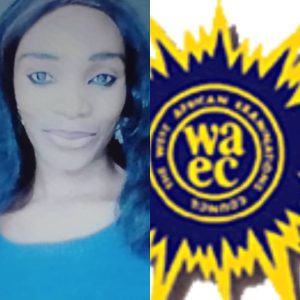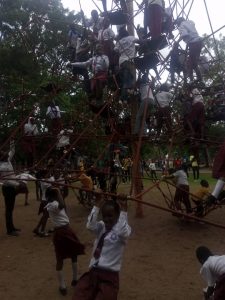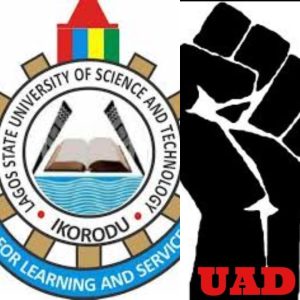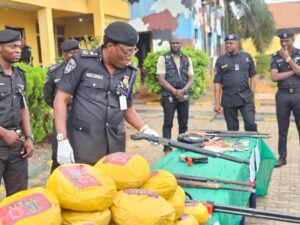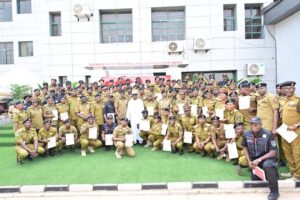We Groom Our Students On Solid Foundation For Global Competition – Dr. Onukwugha
6 min read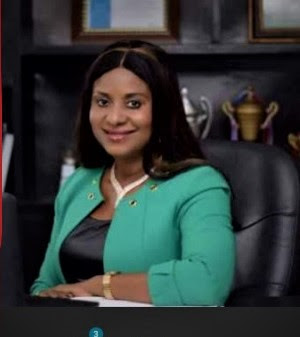
We Groom Our Students On Solid Foundation For Global Competition – Dr. Onukwugha
By Primetime Reports

Dr. Pearl Ihuoma Onukwugha is the President and Founder of Pearlville School, a co-educational institution that provides comprehensive learning experiences that prepare students to face future challenges while also living accomplished, responsible lives. In this interview with IKECHI ELENWOKE, she discusses the challenges facing the educational sector and potential solutions. Excerpts.
What motivated you to invest heavily in education?
My father was so passionate about education that he worked tirelessly to ensure that all of my siblings received a reasonable education. That was a huge source of inspiration and a starting point for us. So, at a very young age, I gathered other kids around and taught them everything I knew. We also organised extra mural classes to help the younger students.
My desire to influence knowledge has been a long-standing phenomenon. I was also fortunate to marry a husband who values quality education, and the sky became my limit. He also holds a doctorate in architecture and is a successful entrepreneur.
What are the issues confronting our educational sector?
There are numerous issues here. There is the question of developing appropriate policies. In all honesty, effective educational policies must address societal needs. This is extremely important. Also, the ministry’s implementation monitoring departments should be proactive in ensuring that goals are met.
The entire world is facing some challenges, and there are fewer white-collar jobs than before, which raises the issue of entrepreneurship and skill acquisition. Such programmes should be taken seriously in our schools during difficult times like these. If we are to move forward as a nation, we must revisit existing policies and curricula regularly. This is critical because our children require the necessary skills to stand on their own.
Moving around our schools, the learning environment is not particularly encouraging. Most schools, particularly public schools, lack the basic tools and facilities required for effective learning.
Some schools have overcrowding issues. Students perch on the windows, while others sit on the bare floor. There are no desks, computers, or chairs. And this is where most private schools perform better. But all hope is not lost. We can still accomplish something if we are determined.
To meet global standards, teachers and administrators must undergo regular retraining.
Teachers and administrators must be compensated adequately. If a worker is not motivated, his morale and dedication to his job suffer. So, all of these are critical issues that require immediate national attention.
What inspired your decision to open a private school, even though it is capital-intensive and has many competitors?
If you visit one of our schools, you will notice that we are not joking. We are fully committed to making a difference. We are here to make a positive difference in our community and around the world. Our school is an international institution. The students come from both inside and outside. We have students from various African countries, Europe, Asia, and America.
According to the records, our students who pursued higher education outside of the country are doing very well. Most of them receive various types of scholarships once they leave Nigeria. The reason is not far-fetched. We put them on a solid foundation for global competition. The results are there because we continue to monitor their progress and development even when they are not with us for proper assessment.
How long has your school existed?
Officially, we began on September 14, 2014. However, the vision had been in the works for more than 17 years before its implementation.
We currently have two arms of the institution. The secondary school has a boarding facility in the quiet town of Avu, Owerri, while the playgroup, nursery, and primary sections are located within the Owerri metropolis, near the Arugo estate.
What steps did you take to prepare for this task?
I have spent the last 32 years learning and improving the system. I thought in primary and secondary school. I also taught in universities, both in Nigeria and in the United States of America.
I knew exactly what I needed, so I took the time to learn the ropes and develop all of the necessary skills. I do not believe in half measures, so I made sure all lines were in the proper places because you can not succeed in a business you do not understand.
I earned my first degree in education at the University of Nigeria, Nsukka, followed by my master’s degree at the University of Lagos. I earned my third and fourth degrees in the United States of America, where I also worked as an adjunct professor.
What is your ultimate goal?
Very clear from the start. We are here to influence knowledge and to groom and nurture a community of learners who will make significant contributions as well. I am talking about children who will grow up to be good leaders with strong character. Students capable of competing on a global scale.
How large is your population?
Our population is reasonable; we do not seek quantity. Our admissions process is rigorous because we want to maintain a standard and avoid overstretching our facilities. We ensure that our students are comfortable and in the right environment and mindset to learn.
There are schools with classes of 50 or more students. Some perched on the windows, while others sat on the bare floor. A situation like that makes effective learning difficult. However, such scenarios are extremely common all around us.
What are your challenges?
Challenges? I do not think I have any. I enjoy what I do because it is what I enjoy doing. I enjoy the job of raising children and imparting knowledge. It is also made easier by having received proper training. I am physically and mentally prepared for the task. Our only major concern is the insecurity that is ravaging some parts of the country.
It is affecting all sectors, not just schools. Ours is an international school. We have students from all over the world, and when they hear more frightening stories about insecurity, they become scared. Some will withdraw their children, particularly those living outside the country. But, honestly, it is not as bad as it appears from the outside; some areas appear to be safer.
Another issue affecting private schools is the economic downturn. Some of our residents are pulling their children out of school, not by choice, but due to financial constraints.
Some of them are also relocating abroad in search of better opportunities. These are a few major issues that pose challenges to the sector.
We do not have any internal issues. Our curriculum is well-designed and meticulously implemented. We have a team of well-trained and dedicated employees who we took our time recruiting. And we try everything we can to motivate them appropriately.
Furthermore, one of the challenges we face in the country is our inability to carry out good policies to their logical conclusion, which usually occurs for reasons I would rather not discuss here.
There are some required subjects for WASC exams, but you will notice that there is no equipment for those subjects, putting our children at a disadvantage.
Not only are secondary and primary schools affected, but also some of our tertiary institutions. Some of them lack functional laboratories, studios, and workshops where practicals are conducted. And unless these issues are addressed, we may be unable to maximise the system’s performance. Who suffers? The students and society at large.
Senator Hope Uzodimma, the executive governor of Imo state, has done an excellent job. When a leader wants to achieve a desirable outcome, he first selects capable hands. That is where success begins, and the governor has not failed in this direction. The commissioner he appointed during the first phase of his administration did well.
One of his achievements was the massive recruitment of teachers for schools, even in the hinterlands. He went to the rural areas to conduct an on-the-spot inspection of the situation there. Remember that Imo State is well-known for its academic prowess, and the commissioner was able to restore that glory in a relatively short period.
Things can still improve if we implement the necessary policies to promote technological advancement.

